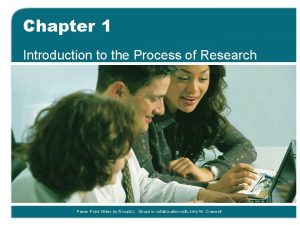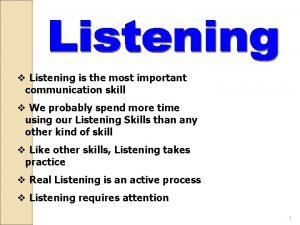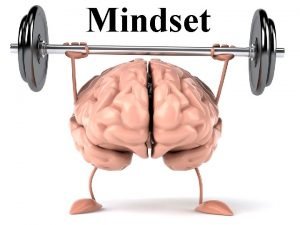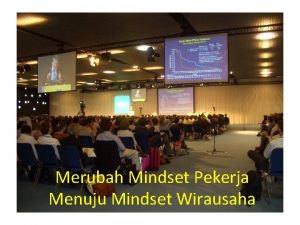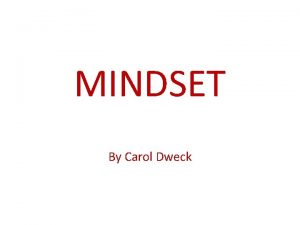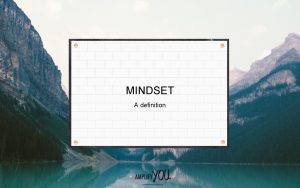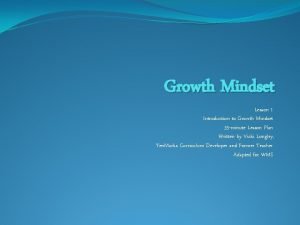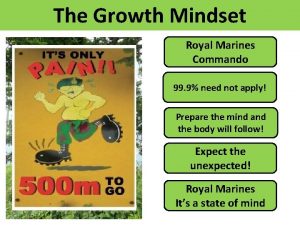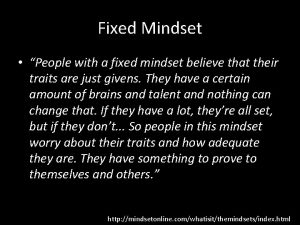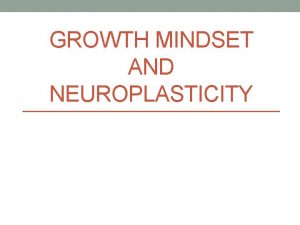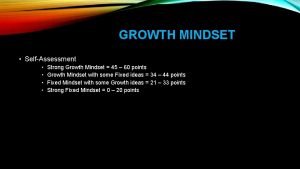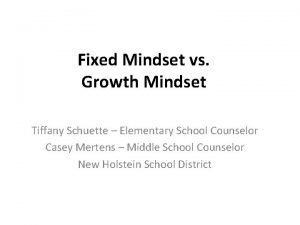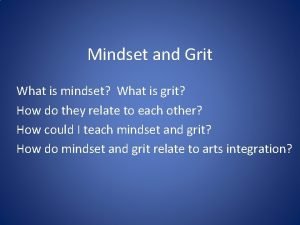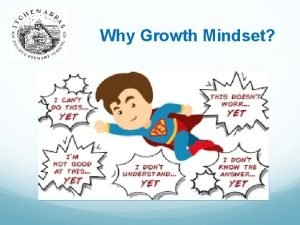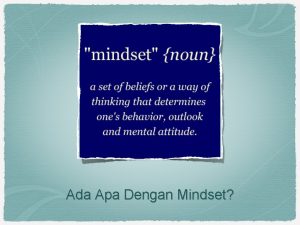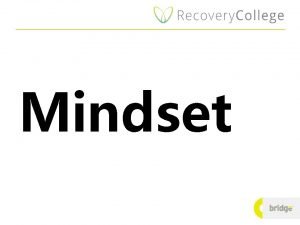GCSE STUDY SKILLS EVENING The importance of mindset














































- Slides: 46

GCSE STUDY SKILLS EVENING • The importance of mindset in successful learning • Summary of GCSE Courses and how progress is monitored • Suggestions for the most effective revision

Mindsets What mindset do you have?

Who are these? CD KR

What’s my mindset? • Complete the questionnaire • Do not discuss with others • Be honest!

Think of a goal or ambition you have achieved. How have you achieved it?

What is intelligence? Discuss! Multiple intelligences? Mainly genetic?

Two hypotheses on intelligence

Modern view of intelligence

What’s my mindset? Then score…. Q 1 - 5 -3 -2 -1 +1 +2 +3 +2 +1 -1 -2 -3 Q 6 - 7 +3

What does the score mean? • A positive score indicates a GROWTH mindset • A negative score indicates a FIXED mindset • • • Around 40% of the population have a growth mindset, 40 % are fixed and around 20% in between the two poles All the evidence from neurochemistry and psychology indicate that intelligence is NOT fixed Intelligence or cognitive ability does vary but it’s not fixed – sustained effort is the more important determinant of success

Mindset Fixed Growth Your belief Intelligence is a fixed trait Intelligence is cultivated through learning Your priority Look smart, not thick Become smarter, through learning You feel smart Achieving easy, low effort successes and outperforming others Engaging fully with new tasks, exerting effort, stretching and applying skills You avoid Effort, difficulty, setbacks, higher- performing peers Easy, previously mastered tasks

Fixed Mindset consequences… • • • Over-generalising from one experience Exaggerating failures relative to success Categorising themselves in unflattering ways Setting self worth contingencies Losing faith in ability to perform tasks Underestimating the efficacy of effort

So what's to do? • Having a fixed mind set may entrench ideas of ability (or lack of it, especially in certain subjects) • Develop a 'growth mind set’ obviously! • Encourage: – Embrace challenge – The idea of neuroplasticity – The use of praise for hard work, resilience and persistence of effort, not ability

Role of Challenge ‘All good is hard. All evil is easy. Dying, losing, cheating, and mediocrity is easy. Stay away from easy. ’ Scott Alexander Encourage persistence in the face of adversity - if you're struggling this in no bad thing, you learn more when you're challenged, if it’s easy you're not learning

What does challenge do? • It changes your brain • This is the general principle of neuroplasticity • The acceptance of neuroplasticity, that is that the brain changes functionally or structurally in response to practice, has been the major advancement in neuroscience and education

Praise is good ? • Praising performance on tasks reinforces the idea of intrinsic ability • We should therefore only praise effort and persistence on a task • Students cannot change their ‘ability’ so why praise it?

“It has become a common practice to praise students for their performance on easy tasks, to tell them they are smart when they do something quickly and perfectly. When we do this we are not teaching them to welcome challenge and learn from errors. We are teaching them that easy success means they are intelligent and, by implication, that errors and effort mean they are not. What should we do if students have had an easy success and come to us expecting praise? We can apologise for wasting their time and direct them to something more challenging. In this way, we may begin to teach them that a meaningful success requires effort. ” (Dweck, Self Theories)

A genius? Child prodigy?

“People make a great mistake who think that my art has come easy to me, no body has devoted so much time and thought to composition as I…. there is not a famous master whose work I have not studied over and over” Mozart “If people knew how hard I had to work to gain my mastery, it would not seem so wonderful at all. ” Michaelangelo “It’s not that I’m so smart; it's just that I stay with problems longer” Einstein

Who are these? “I have always maintained that, excepting fools, men did not differ much in intellect, only in zeal and hard work; ” I'm a meathead. I can't help it, man. You've got smart people and you've got dumb people.

Overwhelmingly popular explanations Occasional explanations Effort - Support from others - Perseverance Luck - Chance - Faith Determination - Risk-taking - Having a go - Patience Realism - Cheating - Coping with obstacles - Practise - Planning Persistence - Making a strategy - Encouragement Self-belief - Positive self-talk - Trying a different approach - Thinking about times I’ve achieved difficult things before - Advice - Interest in it - Imagining myself doing it - Working to repay others’ faith in me - Proving others wrong - Constructive feedback Modifying my goals - Breaking it down into small steps Very rare explanations Natural ability Intelligence - Aptitude A gift or talent

GCSE Course Timeline (Year 10) Christmas Term Spring Term Grade Sheet sent home Parents’ Evening (Wed Feb 9 th) Summer Term Grade Sheet sent home Internal Exams (Tues 18 th April – Fri 28 th April) Grade Sheet sent home Annual Report (Friday 26 th June)

Projected grade Attitude Projected Grade

So what’s a ‘good’ grade? All subjects except for Geology, Technology, Chinese, Business Studies, Latin, PE and Economics have now moved to this new reporting system

Tracking progress Internal Exams Pupil A FFT Estimate 7 Y 10 Dec Y 10 Mar Y 10 May Y 10 July 7 7 6 5 FFT Y 10 Estimate Dec 7 7 7 Y 11 Feb 7 Y 11 Mar 7 Internal Exams Pupil B Y 11 Oct Y 10 Mar Y 10 May Y 10 July 7 7 7 Y 11 Oct 7 Y 11 Feb 7 Y 11 Mar 7

How to revise 'Memory is the residue of thought’

The Key to Successful Revision 1. Get organised • • Ring binder Topic Lists 2. Write notes 3. Sustained revision


The Key to Successful Revision 1. Get organised • • Ring binder Topic Lists 2. Write full notes • • • Use exercise books, text books and other recommended sources – the exam board specification is very useful here Use diagrams to break up the text Draw up a key word/vocabulary/definition list 3. Sustained revision




The Key to Successful Revision 1. Get organised • • Ring binder Topic Lists 2. Write full notes • • • Use exercise books, text books and other recommended sources (see list in pack) Use diagrams to break up the text Draw up a key word/vocabulary/definition list 3. Sustained revision

The Key to Successful Revision 1. Get organised • • Ring binder Topic Lists 2. Write full notes • • Use exercise books, text books and other recommended sources Use diagrams to break up the text 3. Revision • • Testing Distributed practice





So what do I do…. • Space your learning - information that is presented repeatedly over spaced intervals is learned much better than crammed information in one block • Interleave – learning in a block of study feels more effective but it isn't in comparison to interleaving • Test yourself – using our memory improves our memory; this is an example of retrieval practice

What should I not do? • Avoid activities that are passive where little mental effort is required for them. Such activities include: – Reading, then re-reading notes – Copying large chunks of notes/textbooks – Highlighting keywords/passages

Draw up a revision timetable that: - interleaves topics and subjects - ensures that topics are reviewed at least three times - has gaps (or spaces) between reviewing the same topic - has tests or quizzes built in help retrieve the information - builds in reflection (makes you think and connect the ideas to others e. g. ask why)


The Key to Successful Revision 1. Get organised • • Ring binder Topic Lists 2. Write full notes • • Use exercise books, text books and other recommended sources (see list in pack) Use diagrams, colour and highlighting to break up the text 3. Sustained revision • • Testing Distributed practice


Summary • Have a growth mindset – the more you do the better you’ll get • Organise yourself • Write full and detailed notes early on • Use testing to learn information • Plan to use distributed practice • Resources: – https: //www. aft. org/sites/default/files/periodicals/dun losky. pdf – http: //www. learningscientists. org/downloadablematerials/ – https: //www. youtube. com/watch? v=CPx. Szxyl. RCI

• https: //www. amazon. co. uk/s/ref=nb_sb_no ss? url=search-alias%3 Dstripbooks&fieldkeywords=collins+aqa+maths+gcse+revision +guide+higher+new+curriculum+9 -1 https: //www. cgpbooks. co. uk/Student /books_gcse_english_new. books_gcs e_englishlanguage. book_EHS 45
 Importance of study skill
Importance of study skill Geography paper 1 case studies aqa
Geography paper 1 case studies aqa Importance of motor skills in child developmentdevelopment
Importance of motor skills in child developmentdevelopment Importance of research skills
Importance of research skills Barriers to communication
Barriers to communication Importance of listening
Importance of listening Intrapersonal skills example
Intrapersonal skills example Soft skills examples
Soft skills examples Essential skills ontario
Essential skills ontario Hình ảnh bộ gõ cơ thể búng tay
Hình ảnh bộ gõ cơ thể búng tay Ng-html
Ng-html Bổ thể
Bổ thể Tỉ lệ cơ thể trẻ em
Tỉ lệ cơ thể trẻ em Chó sói
Chó sói Thang điểm glasgow
Thang điểm glasgow Hát lên người ơi alleluia
Hát lên người ơi alleluia Môn thể thao bắt đầu bằng từ chạy
Môn thể thao bắt đầu bằng từ chạy Thế nào là hệ số cao nhất
Thế nào là hệ số cao nhất Các châu lục và đại dương trên thế giới
Các châu lục và đại dương trên thế giới Công thức tiính động năng
Công thức tiính động năng Trời xanh đây là của chúng ta thể thơ
Trời xanh đây là của chúng ta thể thơ Mật thư anh em như thể tay chân
Mật thư anh em như thể tay chân Làm thế nào để 102-1=99
Làm thế nào để 102-1=99 Phản ứng thế ankan
Phản ứng thế ankan Các châu lục và đại dương trên thế giới
Các châu lục và đại dương trên thế giới Thơ thất ngôn tứ tuyệt đường luật
Thơ thất ngôn tứ tuyệt đường luật Quá trình desamine hóa có thể tạo ra
Quá trình desamine hóa có thể tạo ra Một số thể thơ truyền thống
Một số thể thơ truyền thống Cái miệng nó xinh thế chỉ nói điều hay thôi
Cái miệng nó xinh thế chỉ nói điều hay thôi Vẽ hình chiếu vuông góc của vật thể sau
Vẽ hình chiếu vuông góc của vật thể sau Thế nào là sự mỏi cơ
Thế nào là sự mỏi cơ đặc điểm cơ thể của người tối cổ
đặc điểm cơ thể của người tối cổ Ví dụ về giọng cùng tên
Ví dụ về giọng cùng tên Vẽ hình chiếu đứng bằng cạnh của vật thể
Vẽ hình chiếu đứng bằng cạnh của vật thể Tia chieu sa te
Tia chieu sa te Thẻ vin
Thẻ vin đại từ thay thế
đại từ thay thế điện thế nghỉ
điện thế nghỉ Tư thế ngồi viết
Tư thế ngồi viết Diễn thế sinh thái là
Diễn thế sinh thái là Dot
Dot Thế nào là số nguyên tố
Thế nào là số nguyên tố Tư thế ngồi viết
Tư thế ngồi viết Lời thề hippocrates
Lời thề hippocrates Thiếu nhi thế giới liên hoan
Thiếu nhi thế giới liên hoan ưu thế lai là gì
ưu thế lai là gì Sự nuôi và dạy con của hươu
Sự nuôi và dạy con của hươu



